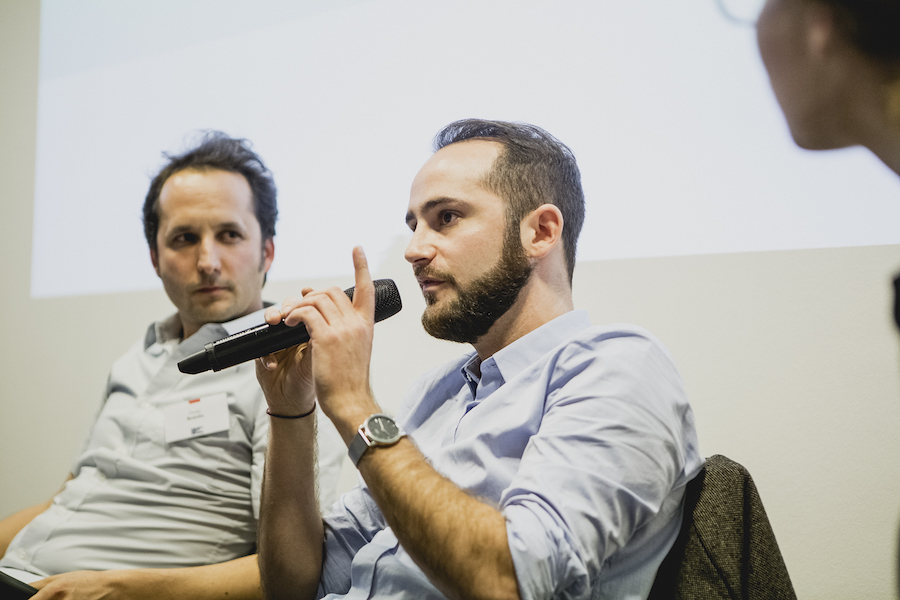Politics in the digital society
Microtargeting, Cambridge Analytica, blockchains and General Data Protection Regulation (GDPR) are the buzzwords that have predominated in headlines and public discussions in recent months. The developments associated to their popularity bear proof that foresighted political engagement is urgently needed to actively shape the digital society in which we live.
When democracy and personal data of citizens are at stake, a try-out-and-excuse-later approach can no longer be accepted, says data protection and security expert Aleksandra Sowa, author of Digital Politics: How the Web is Changing Democracy. In the book, Sowa analyses the political dimension of digitalization and the emerging consequences, a topic that was at the heart of a panel discussion with the author that took place in Düsseldorf (Germany) in May. On the occasion, the FES Connect team spoke to Sowa about political organizing and democracy under Web 2.0 and the possibilities and limitations a digital society and technology offer for democratic politics.
Voters, especially young adults, are turning to online platforms for news and are more likely to get it from friends, according to a study (link) by the Pew Research Center in the United States. How similar to this are preferences among voters in Germany and Europe? How is this switch to online platforms as a source of information changing civic participation and organizing in politics for the better?
When the Hans-Bredow-Institut, in a survey conducted in 2011, asked about the most important media for political opinion formation in Germany, the search engine Google ranked second. Otherwise, the Digital News Report 2016 (link) by the Reuters Institute for the Study of Journalism suggests that, for Germans, TV remains the most important source of information. Around half of those surveyed gave this reply. The answer therefore also depends to some extent on who is being asked and who is asking the question [smiles]. In the USA, TV was easily the most influential branch of the media in determining the outcome of the election; social media, radio and newspapers were just some in a range of other factors, according to a study by Stanford University (link in German). The Reuters report found, however, that the situation among 18- to 24-year-olds is very different in Germany, where social media play a far more important role.
The work of psychologist Michal Kosinski met with little interest few years back although it showed how "the ‘ocean model’ much cited in the context of Cambridge Analytica and micro-targeting can be used to clearly tag or identify users [...] with the help of the information made available by Facebook users".
Such studies are only snapshots, however. Election campaigning is now a permanent enterprise, driven by commercial and social media. On TV and radio, national politics has now become a daily soap opera. It is thus reasonable to assume that in the future, other electoral groups will turn their backs on traditional commercial media and seek out new, alternative information channels.
The scandals concerning private data harvesting by different tools and apps on social media platforms, along with online communities of trolls and fake news with the purpose of sabotaging and tilting political processes, are among many examples that reveal how easily a digital society can render people and groups defenceless. What dangers does this hold for democracy?
When psychologist Michal Kosinski, currently researching at Stanford Unviersity, showed in a study several years ago how the "ocean model"—much cited in the context of Cambridge Analytica and micro-targeting—can be used to clearly tag or identify users, complete with all their personal traits, with the help of the information made available by Facebook users, his work met with little interest. I read a technical article on the subject as early as 2013.
The evaluation of mass data and data analysis help to determine whom to target, when and with what messages they can be reached most easily. They are supposed to help in door-to-door election campaigning to win over voters and to mobilize non-voters. Political parties in Germany have already made every effort to link online election campaigning and canvassing. Successful election campaigns from Obama to Macron have made comprehensive use of the possibilities made available by data analysis and digital campaigning. We are all too familiar with this now and in the next election campaign people will have to come up with something entirely new to carry the day against their political rivals.
It may be that defence mechanisms against the abuse of data analysis, micro-targeting, fake news and disinformation will shortly become so effective that their deployment will no longer be worthwhile. But then presumably the powerful will find other technologies and instruments to exercise their power.
The far-right political party, Alternative for Germany (AfD), was declared a winner in the Facebook battle around the 2017 German elections, reportedly using a high volume of sensationalist posts and building a grassroots base of virtual supporters and trolls. Has digital technology defeated the possibility for democracy in the digital society?
There is no "good or bad technology as such", wrote the futurologist Stanislaw Lem in Summa Technologiae; it "provides us with means and tools, but credit or blame for putting them to good or bad use lies with us". And just as this assertion was previously applied to the—peaceful or not so peaceful—use of atomic energy, it now applies to the internet, networking and digitalization.
The internet was seen as a particularly attractive medium for politics as early as the 1990s due not only to a wealth of information it makes available; as a place for political organization and global understanding the internet also brings together people with the same aims and makes it possible to combine their political clout. The possibilities that such technology offers are freely available to all political parties, but that of course means the AfD every bit as much as the Social Democrats.
The General Data Protection Regulation, the law on data protection and privacy for all individuals within the European Union, entered into force in May. Will it live up to its promise? What else can be done to regulate the digital space in a progressive and inclusive way?
If we want to use the potential of digitalization on behalf of voters and citizens and to curtail their negative consequences, politics has to get involved. Not only as user and consumer, but also as shaper and regulator. And politics has to develop the framework in such a way that the positive forces of digitalization will be able to unfold. This is one of the reasons US security guru Bruce Schneier has postulated for more participation in political processes by people with technical understanding.
The General Data Protection Regulation is an important step that will make it possible to restore the balance of power between users and the dominant tech giants. But it is important to understand that it is only a first step. It is incumbent on national governments to fill the gaps deliberately left open by the General Data Protection Regulation with domestic legislation, including establishing a balance between freedom of opinion and data protection. It is also important to rectify any shortcomings as regards implementation. That, too, is a matter for politics: Ordinary people will scarcely be able to assert themselves against tech giants such as Google and Facebook by means of their individual rights.
Half of the 4 billion internet users in the world are located in Asia, where in July a recommendation was passed in India in favor of net neutrality. Yet, net neutrality rules were repealed in the United States earlier this year. Why should this news concern us? What are the threats that may throttle net neutrality?
Why should Asian or US legislation concern us in Europe? That’s an excellent question, to which California Senator Robert M. Hertzberg recently gave an equally excellent answer in response to his critics who wondered what kind of effect a law on the compulsory labelling of bots [the "bot bill"] that applies only in California would have on the internet. It will have an effect, the senator explained to the New York Times, because after all, most tech giants are based in California (link).
Blockchain, Bitcoin’s underlying technology, is hailed as the decentralized technology that holds great participatory and redistributive potential. How real is this promise?
In the long term perspective, the internet—and in due course, digitalization—was expected to enable direct citizens’ participation and decision-making in online referenda and may make political representatives and intermediaries totally superfluous. In the medium term, however, we should at least content ourselves with using its strengths to improve participation and political communication: interaction between citizens, facilitating the exercise of voice in political decision-making and political debate and getting informed citizens involved.

The possibilities and limits of blockchain [technology] are being scientifically tested, among other things in the context of voting. What makes sense and works well for voting for music preferences, in let's say Spotify, however, is not necessarily equally good for democratic elections.
Blockchain technology is relatively new, and its possible applications are still being examined. The tech company slogan "try out and excuse later" should be set aside when it comes to the implementation of disruptive technologies in democratic processes. Democracy is hard work. In that context, it is a much better idea to thoroughly test it first and then to deploy it. Or even not to deploy it at all. To decide, not to digitalize something, needs courage. Progress must always be for the sake of people.
In your new book Digital Politics, you describe artificial intelligence as unsteady, changeable and always on the move to further develop itself. What is the future of politics, with automation and machine learning under way?
Robots are supposed to be efficient, unsubornable, objective and incorruptible: incapable of harming people or of tyranny, corruption, stupidity and prejudice. "Machines have undoubtedly already surpassed us in many areas," wrote the futurologist Stanislaw Lem, offering the example of medical diagnosis, in which machines provide medical appraisals easily as good as those of good doctors.
In contrast to people, robots and machines have to stick to the moral principles we program into them (that means either: they do not adhere to the instructions they haven't been given).
Summing up, robots embody everything voters feel is lacking in politics. That’s why, personally, I’m in favour of a robo-chancellor [smiles]. The same phrases, postures and programs; from maintaining party discipline in the Bundestag to the Chancellor’s New Year speech, one might, indeed, ask whether we’re being ruled by political machines already. Without even knowing it.
###
For more information on the event and the work by the FES North Rhine-Westphalia office contact the office team and follow them on Twitter for daily updates.
About FES Connect
Connecting people, in the spirit of social democracy, we source and share content in English from the German and international network of the Friedrich-Ebert-Stiftung.













